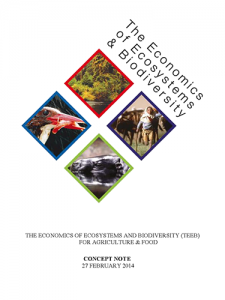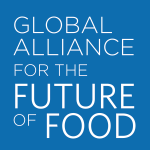Interim report (2015)
 Download: English | Español | Bahasa Indonesia
Download: English | Español | Bahasa Indonesia
The Interim Report introduces the key questions, issues and arguments to be addressed by TEEBAgriFood. Interim results are presented from five exploratory sector studies (on livestock, rice, agroforestry, inland fisheries and palm oil), while the development of a ‘valuation framework’ provides a common lens for ensuring that the full range of impacts and dependencies can be examined under different applications (i.e. by sector, system or practice). Finally, the Report examines the way forward for this study by identifying economic and policy drivers and incentives that influence land-use decisions and management techniques within production systems around the world.
The Interim Report was launched at the Global Landscapes Forum in December 2015. Read more
Towards a Global Study on the Economics of Eco-Agri-Food Systems report (2015)
 Download: English
Download: English
‘Towards a Global Study on the Economics of Eco-Agri-Food Systems’ presents some first insights into TEEBAgriFood and its objectives. It starts to drill into some of the key policy issues around agriculture and explore the latest evidence on the dependency of agri-food systems on ecosystems and biodiversity, the impacts on human and ecological well-being and health, and the underappreciated role of small-scale farmers.
Concept note (2014)
 Download: English
Download: English
The TEEB for Agriculture & Food Concept Note presents the case for and proposed outline content of a TEEB for Agriculture & Food study. The study would review the inter-dependencies between agriculture and food systems and natural ecosystems in order to assess the social, environmental, economic and health-related benefits and costs of these systems, so that governments and businesses can use the information and recommendations to improve decision-making.
Exploratory studies (2014)
In an effort to deepen our understanding of the evidence on the hidden environmental and social costs of agriculture and food systems on human and nature, and feed these into the TEEBAgriFood analysis, a series of exploratory studies were launched that focused on ‘externalities-heavy’ and geographically widespread agricultural sectors, including:
- Agroforestry (Ethiopia, Ghana, Tanzania)
- Inland fisheries (Columbia River, Mekong River, Lake Victoria)
- Livestock (Brazil, India, Indonesia, Netherlands, Tanzania)
- Palm oil (global)
- Rice (California [US], Cambodia, Costa Rica, Philippines, Senegal)
- Maize (Ecuador, Mexico, US Corn Belt)
IMPORTANT: Since the launch of these studies, the scope of TEEBAgriFood has evolved in that the approach seeks to be universal and comprehensive in coverage, both in terms of all economic, environmental and social dimensions as well as looking across the value chain (production, processing and distribution, and waste). Therefore, by today’s standards, the results of these exploratory studies may appear partial from a TEEBAgriFood perspective, either by focusing only on impacts and dependencies on natural systems, or limiting analysis to farm-gate boundaries. However, each of these sector-specific snapshots allowed us to paint a global picture on the economic interdependencies between agri-food systems, human systems and natural systems.
Further, on the pages linked above, the TEEB Office has inserted a brief update in order to better contextualize each study and its coverage within the larger mandate of TEEBAgriFood and its Evaluation Framework. More specifically, it includes a brief description of the development of the Framework, a detailed look at what is and is not covered by the scope of this study, and some recommendations for future research that may help support the goals of the TEEBAgriFood project.
More recently, some of the case studies in the African region (namely rice in Senegal, livestock in Tanzania, and agroforestry in Ghana and Ethiopia) have been further developed and aligned with the comprehensive approach of TEEBAgriFood. Read more.



